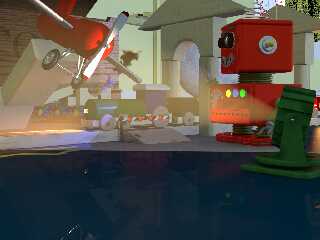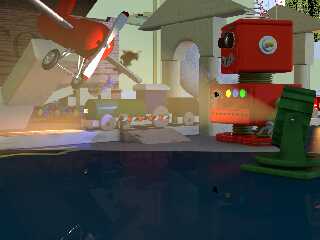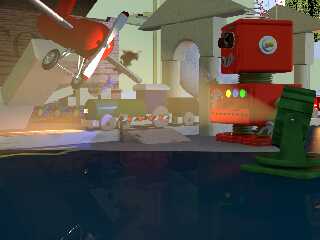 |
 |
|
 |
|
 |
|  |
|  |
|
 |
|
 |
|  |
|  |
|
 |
"Chris R" <car### [at] comcast net> wrote:
> Latest attempt at an indoor scene lit by sunlight from a window. I ended up
> adding some extra lights for interest on the toys, too.
>
> This particular rendering was done with a pretty high anti-aliasing setting, but
> just the Radiosity_Fast setting for radiosity. Even increasing it to
> Radiosity_IndoorLQ introduced terrible artifacts on all of my isosurfaces, and I
> haven't figured out how to eliminate them yet.
>
> The blocks, the plane, the train and tracks are all isosurfaces with wood
> pattern perturbations. I experimented with a lot of combinations of low
> accuracy and high max_gradient, and used evaluation, but when I bump up the
> radiosity I end up with black splotches everywhere. I may need to dig into the
> details of the radiosity settings to figure out how to tune them for a
> particular scene...
>
> -- Chris R.
I added a few more elements to the scene, including some haze, generated by the
smoke puffing out of the train engine.
For this run, here were my radiosity settings:
pretrace_start 0.0625
pretrace_end 0.0078125
count 25
nearest_count 5
error_bound 0.25
low_error_factor 0.3
recursion_limit 2
-- Chris R. net> wrote:
> Latest attempt at an indoor scene lit by sunlight from a window. I ended up
> adding some extra lights for interest on the toys, too.
>
> This particular rendering was done with a pretty high anti-aliasing setting, but
> just the Radiosity_Fast setting for radiosity. Even increasing it to
> Radiosity_IndoorLQ introduced terrible artifacts on all of my isosurfaces, and I
> haven't figured out how to eliminate them yet.
>
> The blocks, the plane, the train and tracks are all isosurfaces with wood
> pattern perturbations. I experimented with a lot of combinations of low
> accuracy and high max_gradient, and used evaluation, but when I bump up the
> radiosity I end up with black splotches everywhere. I may need to dig into the
> details of the radiosity settings to figure out how to tune them for a
> particular scene...
>
> -- Chris R.
I added a few more elements to the scene, including some haze, generated by the
smoke puffing out of the train engine.
For this run, here were my radiosity settings:
pretrace_start 0.0625
pretrace_end 0.0078125
count 25
nearest_count 5
error_bound 0.25
low_error_factor 0.3
recursion_limit 2
-- Chris R.
Post a reply to this message
Attachments:
Download 'scene-v1.2-mq-2022-02-12.png' (739 KB)
Preview of image 'scene-v1.2-mq-2022-02-12.png'

|
 |
|  |
|  |
|
 |
|
 |
|  |
|  |
|
 |
"Chris R" <car### [at] comcast net> wrote:
> Latest attempt at an indoor scene lit by sunlight from a window. I ended up
> adding some extra lights for interest on the toys, too.
>
> This particular rendering was done with a pretty high anti-aliasing setting, but
> just the Radiosity_Fast setting for radiosity. Even increasing it to
> Radiosity_IndoorLQ introduced terrible artifacts on all of my isosurfaces, and I
> haven't figured out how to eliminate them yet.
>
> The blocks, the plane, the train and tracks are all isosurfaces with wood
> pattern perturbations. I experimented with a lot of combinations of low
> accuracy and high max_gradient, and used evaluation, but when I bump up the
> radiosity I end up with black splotches everywhere. I may need to dig into the
> details of the radiosity settings to figure out how to tune them for a
> particular scene...
>
> -- Chris R.
I tried a number of combinations of higher-quality radiosity settings and am
still getting artifacts; the higher the count and lower the error_bound the
worse the artifacts. In the image below, I took the radiosity settings from
before and just cut the pretrace_end size in half. As you can see, this
introduced a noticeable, but relatively small artifact on the robot's
glass-covered dial. I am running again with these same settings, but adding a
maximum_reuse of 0.05 and a minimum_reuse of 0.005 to see if that makes the
artifact go away or makes it worse.
-- Chris R. net> wrote:
> Latest attempt at an indoor scene lit by sunlight from a window. I ended up
> adding some extra lights for interest on the toys, too.
>
> This particular rendering was done with a pretty high anti-aliasing setting, but
> just the Radiosity_Fast setting for radiosity. Even increasing it to
> Radiosity_IndoorLQ introduced terrible artifacts on all of my isosurfaces, and I
> haven't figured out how to eliminate them yet.
>
> The blocks, the plane, the train and tracks are all isosurfaces with wood
> pattern perturbations. I experimented with a lot of combinations of low
> accuracy and high max_gradient, and used evaluation, but when I bump up the
> radiosity I end up with black splotches everywhere. I may need to dig into the
> details of the radiosity settings to figure out how to tune them for a
> particular scene...
>
> -- Chris R.
I tried a number of combinations of higher-quality radiosity settings and am
still getting artifacts; the higher the count and lower the error_bound the
worse the artifacts. In the image below, I took the radiosity settings from
before and just cut the pretrace_end size in half. As you can see, this
introduced a noticeable, but relatively small artifact on the robot's
glass-covered dial. I am running again with these same settings, but adding a
maximum_reuse of 0.05 and a minimum_reuse of 0.005 to see if that makes the
artifact go away or makes it worse.
-- Chris R.
Post a reply to this message
Attachments:
Download 'scene-v1.2-h1-2022-02-13.png' (736 KB)
Preview of image 'scene-v1.2-h1-2022-02-13.png'

|
 |
|  |
|  |
|
 |
|
 |
|  |
|  |
|
 |
For what it is worth, I generally use the following radiosity settings,
to full satisfaction:
pretrace_start 0.08
pretrace_end 0.004
count 100, 1000
nearest_count 10, 5
error_bound 1
recursion_limit 2
low_error_factor 0.3
gray_threshold 0.0
minimum_reuse 0.015
maximum_reuse 0.1
brightness 1
adc_bailout 0.01/2
normal on
media off
always_sample off
This is quite fast and I experience little or no artefacts. Note the
dual (optional) parameters used for count and nearest_count. This can
increase the quality of your render without slowing it down much. See
the following page of the wiki:
https://wiki.povray.org/content/Reference:Radiosity#count
You may also want to try stochastic rendering with, e.g., +am3 +a0.01
+ac0.90 +r3. If you do that, change count to 10 all other radiosity
settings remaining the same.
--
Thomas
Post a reply to this message
|
 |
|  |
|  |
|
 |
|
 |
|  |
|  |
|
 |
Thomas de Groot <tho### [at] degroot org> wrote:
> For what it is worth, I generally use the following radiosity settings,
> to full satisfaction:
>
> pretrace_start 0.08
> pretrace_end 0.004
> count 100, 1000
> nearest_count 10, 5
> error_bound 1
> recursion_limit 2
> low_error_factor 0.3
> gray_threshold 0.0
> minimum_reuse 0.015
> maximum_reuse 0.1
> brightness 1
>
> adc_bailout 0.01/2
> normal on
> media off
> always_sample off
>
> This is quite fast and I experience little or no artefacts. Note the
> dual (optional) parameters used for count and nearest_count. This can
> increase the quality of your render without slowing it down much. See
> the following page of the wiki:
> https://wiki.povray.org/content/Reference:Radiosity#count
>
> You may also want to try stochastic rendering with, e.g., +am3 +a0.01
> +ac0.90 +r3. If you do that, change count to 10 all other radiosity
> settings remaining the same.
>
> --
> Thomas
Thanks, I tried these out and they seem to have worked pretty well.
-- Chris R. org> wrote:
> For what it is worth, I generally use the following radiosity settings,
> to full satisfaction:
>
> pretrace_start 0.08
> pretrace_end 0.004
> count 100, 1000
> nearest_count 10, 5
> error_bound 1
> recursion_limit 2
> low_error_factor 0.3
> gray_threshold 0.0
> minimum_reuse 0.015
> maximum_reuse 0.1
> brightness 1
>
> adc_bailout 0.01/2
> normal on
> media off
> always_sample off
>
> This is quite fast and I experience little or no artefacts. Note the
> dual (optional) parameters used for count and nearest_count. This can
> increase the quality of your render without slowing it down much. See
> the following page of the wiki:
> https://wiki.povray.org/content/Reference:Radiosity#count
>
> You may also want to try stochastic rendering with, e.g., +am3 +a0.01
> +ac0.90 +r3. If you do that, change count to 10 all other radiosity
> settings remaining the same.
>
> --
> Thomas
Thanks, I tried these out and they seem to have worked pretty well.
-- Chris R.
Post a reply to this message
Attachments:
Download 'scene-v1.2-tdg-hq-2022-02-14.png' (723 KB)
Preview of image 'scene-v1.2-tdg-hq-2022-02-14.png'

|
 |
|  |
|  |
|
 |
|
 |
|  |
|  |
|
 |
Op 15/02/2022 om 04:43 schreef Chris R:
>
> Thanks, I tried these out and they seem to have worked pretty well.
>
> -- Chris R.
Indeed. Looks pretty good. Most credit goes to Clipka and Alain I
believe, not forgetting all those povers struggling and coming up with
smart solutions. :-)
It is a fair basis from which tweaking can be done simply when necessary.
--
Thomas
Post a reply to this message
|
 |
|  |
|  |
|
 |
|
 |
|  |
|  |
|
 |
"Chris R" <car### [at] comcast net> wrote:
> Thomas de Groot <tho### [at] degroot net> wrote:
> Thomas de Groot <tho### [at] degroot org> wrote:
> > For what it is worth, I generally use the following radiosity settings,
> > to full satisfaction:
> > [snip]
> >
> > This is quite fast and I experience little or no artifacts. Note the
> > dual (optional) parameters used for count and nearest_count. This can
> > increase the quality of your render without slowing it down much.
>
> Thanks, I tried these out and they seem to have worked pretty well.
>
This does look much better.
About the 2-value count: In my own tests over the last six months, I have set
the 2nd value *really* high -- for example 700, 93271 (!) I have found that it
seems to smooth-out the distribution of the radiosity light patches, by
gathering them from many truly different random directions. (That's my rather
simplistic description of the process, anyway.) With a single-value count, those
directions/locations are still random-- to a degree-- but 'not quite random
enough', in my opinion; I have seen some subtle artifacts that look like
'harmonic bands' of rad patches on objects...like very subtle geometric bands or
stripes. Sorry that I can't be more descriptive, but it's an effect that the
higher 2nd count helps to eliminate. org> wrote:
> > For what it is worth, I generally use the following radiosity settings,
> > to full satisfaction:
> > [snip]
> >
> > This is quite fast and I experience little or no artifacts. Note the
> > dual (optional) parameters used for count and nearest_count. This can
> > increase the quality of your render without slowing it down much.
>
> Thanks, I tried these out and they seem to have worked pretty well.
>
This does look much better.
About the 2-value count: In my own tests over the last six months, I have set
the 2nd value *really* high -- for example 700, 93271 (!) I have found that it
seems to smooth-out the distribution of the radiosity light patches, by
gathering them from many truly different random directions. (That's my rather
simplistic description of the process, anyway.) With a single-value count, those
directions/locations are still random-- to a degree-- but 'not quite random
enough', in my opinion; I have seen some subtle artifacts that look like
'harmonic bands' of rad patches on objects...like very subtle geometric bands or
stripes. Sorry that I can't be more descriptive, but it's an effect that the
higher 2nd count helps to eliminate.
Post a reply to this message
|
 |
|  |
|  |
|
 |
|
 |
|  |
|
 |




![]()